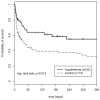Mild therapeutic hypothermia shortens intensive care unit stay of survivors after out-of-hospital cardiac arrest compared to historical controls
- PMID: 18554414
- PMCID: PMC2481476
- DOI: 10.1186/cc6925
Mild therapeutic hypothermia shortens intensive care unit stay of survivors after out-of-hospital cardiac arrest compared to historical controls
Abstract
Introduction: Persistent coma is a common finding after cardiac arrest and has profound ethical and economic implications. Evidence suggests that therapeutic hypothermia improves neurological outcome in these patients. In this analysis, we investigate whether therapeutic hypothermia influences the length of intensive care unit (ICU) stay and ventilator time in patients surviving out-of-hospital cardiac arrest.
Methods: A prospective observational study with historical controls was conducted at our medical ICU. Fifty-two consecutive patients (median age 62.6 years, 43 males, 34 ventricular fibrillation) submitted to therapeutic hypothermia after out-of-hospital cardiac arrest were included. They were compared with a historical cohort (n = 74, median age 63.8 years, 53 males, 43 ventricular fibrillation) treated in the era prior to hypothermia treatment. All patients received the same standard of care. Neurological outcome was assessed using the Pittsburgh cerebral performance category (CPC) score. Univariate analyses and multiple regression models were used.
Results: In survivors, therapeutic hypothermia and baseline disease severity (Acute Physiology and Chronic Health Evaluation II [APACHE II] score) were both found to significantly influence ICU stay and ventilator time (all P < 0.01). ICU stay was shorter in survivors receiving therapeutic hypothermia (median 14 days [interquartile range (IQR) 8 to 26] versus 21 days [IQR 15 to 30] in the control group; P = 0.017). ICU length of stay and time on ventilator were prolonged in patients with CPC 3 or 4 compared with patients with CPC 1 or 2 (P = 0.003 and P = 0.034, respectively). Kaplan-Meier analysis showed improved probability for 1-year survival in the hypothermia group compared with the controls (log-rank test P = 0.013).
Conclusion: Therapeutic hypothermia was found to significantly shorten ICU stay and time of mechanical ventilation in survivors after out-of-hospital cardiac arrest. Moreover, profound improvements in both neurological outcome and 1-year survival were observed.
Figures



References
-
- Nolan JP, Morley PT, Hoek TL Vanden, Hickey RW, Kloeck WG, Billi J, Böttiger BW, Morley PT, Nolan JP, Okada K, Reyes C, Shuster M, Steen PA, Weil MH, Wenzel V, Hickey RW, Carli P, Hoek TL Vanden, Atkins D, International Liaison Committee on Resuscitation Therapeutic hypothermia after cardiac arrest: an advisory statement by the advanced life support task force of the International Liaison Committee on Resuscitation. Circulation. 2003;108:118–121. doi: 10.1161/01.CIR.0000079019.02601.90. - DOI - PubMed
-
- Merchant RM, Soar J, Skrifvars MB, Silfvast T, Edelson DP, Ahmad F, Huang KN, Khan M, Hoek TL Vanden, Becker LB, Abella BS. Therapeutic hypothermia utilization among physicians after resuscitation from cardiac arrest. Crit Care Med. 2006;34:1935–1940. doi: 10.1097/01.CCM.0000220494.90290.92. - DOI - PubMed
MeSH terms
LinkOut - more resources
Full Text Sources
Other Literature Sources
Medical

